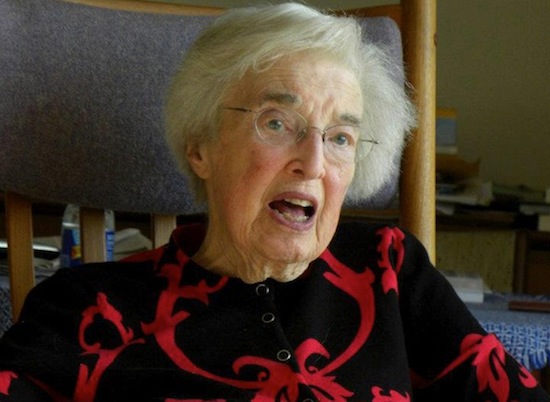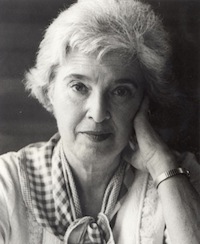Gerda Lerner, women’s studies pioneer, dies at 92

Gerda Lerner, shown during an interview in 2012, was “fierce, brilliant and unique,” says social and political activist Gloria Steinem.
Photo: Renata Keller
Gerda Lerner, Robinson Edwards Professor Emerita of History at the University of Wisconsin–Madison, died on Wednesday, Jan. 2 in an assisted-living facility in Madison. She was 92 years old.
“Gerda Lerner was fierce, brilliant and unique,” says social and political activist Gloria Steinem. “She lived history by her bravery, restored history by her scholarship and democratized its study by her activism. She understood, as Paula Gunn Allen wrote, that ‘the root of oppression is the loss of memory.'”
William Cronon, president of the American Historical Association, commented on Lerner’s life immediately following his keynote address at the group’s annual meeting.
“Gerda Lerner pioneered the field of women’s history,” says Cronon, Frederick Jackson Turner and Vilas Research Professor of History, Geography, and Environmental Studies. “With her passing we mourn not only the loss of a close friend and colleague, but a true giant in the field. She created one of the world’s leading centers for the study of women’s and gender history when she moved to UW–Madison, and the program she and her colleagues built remains a crown jewel of the university.”
Lerner’s life and work, so inextricably intertwined, gained prominence thanks to her fearless, continual examination of the world.
“In our culture, and in most patriarchal cultures, we have made an artificial division between thinking and acting, as though the two were mutually exclusive,” she said in a 2002 interview with the Wisconsin Academy Review. “The most important thing, the thing I have always lived by, is that you must be engaged in some way in the world in which you live. How, is for each person to choose.”
To view a video interview with Lerner, done in May 2012 by Renata Keller for the upcoming documentary “Living History,” click here.
Gerda Kronstein was born in Vienna, Austria on April 30, 1920. Raised in an upper-middle-class Jewish family, Lerner developed a strong sense of justice at an early age, as she noticed the unequal treatment of household servants. But her lens on the world changed dramatically when the Nazi regime imprisoned her family.

Lerner in 1981
Photo: Martha Nelson
As she recounted 63 years later in “Fireweed: A Political Autobiography,” the “fragile community of survival” she developed with her cellmates taught her that “if you wanted to survive you could not do it alone and you had to fight with all your strength to keep some sort of social contract. . . . These hours, days, weeks and months in jail were the most important events of my life: they gave it a meaning and a shape I have ever since tried to comprehend.”
Lerner’s life experience equipped her to resist conformity — in particular, questioning the societal norms insisting that women had no history.
“Having lived through the transition from being an accepted and rather privileged member of society and from one day to the next being a total outcast and victim, I learned something about how society can manipulate people,” she said in 2002. “I applied that to understanding how it was possible to manipulate half the people of the world to accept that they are inferior.”
After emigrating to the United States as a refugee, she ended up in New York and settled into a happy marriage with filmmaker Carl Lerner. An activist in grassroots social and political movements, her projects included co-writing the screenplay for “Black Like Me,” directed by her husband.
Only at age 38, when her children were older, did she begin college. She received her BA from the New School for Social Research in 1963 and went on to complete an MA and Ph.D. from Columbia University in an astonishing three years, finishing in 1966.
“She lived history by her bravery, restored history by her scholarship and democratized its study by her activism. She understood, as Paula Gunn Allen wrote, that ’the root of oppression is the loss of memory.’”
Gloria Steinem
Just getting women’s history recognized as a discipline was difficult enough. At Columbia, she found deep resistance to her studies of women’s history, not yet considered a scholarly field. Even at Sarah Lawrence College, predominantly a women’s college, she faced resistance to the idea of a course in women’s history.
Lerner’s nuanced understanding of women’s history eschewed simple reverence for influential women in favor of a rigorous exploration of women’s lives.
The first generation of women’s historians had an urgency, a political aim, to recover the voices of women whose contributions had been lost.
“The idea that women have a contribution to make as women: that’s what makes her such a powerful influencer of the women’s movement,” says Terry O’Neill, president of the National Organization for Women. “She’s made actual gains possible; she provided the theoretical foundation for policymaking that we are able to do today.”
Lerner’s work paved the way for other subfields of study that had struggled for respect. As editor of the groundbreaking 1972 book “Black Women in White America: A Documentary History,” she had a profound impact on the development of Black Women’s Studies.
“Perhaps because of her early experiences with fascism, anti-semitism, immigration and poverty, her scholarship was nuanced, careful, and smart and always inclusive of the critical dimensions and intersections of race, gender and class,” says former UW–Madison colleague Stanlie James, professor of African and African American Studies and Women and Gender Studies at Arizona State University.
In 1972, the field had progressed enough for Lerner to found the nation’s first master’s degree in women’s history. In 1980, following her husband’s death, she moved to UW–Madison to establish a doctoral program.
Lerner often spoke passionately about the cost of being a pioneer — the only one, the first one, a minority.
“It really is about that generation of women who have come up through the school of hard knocks,” says longtime friend Florencia Mallon, Julieta Kirkwood Professor of History and department chair. “They want to make sure that the women who come after them know that it won’t be easy. And to a large extent, they were right; the next generation didn’t have it easy, either.”
Lerner’s tenacity earned her a reputation for antagonizing students and colleagues. To some, though, that weakness was also her great strength. Her willingness to be disliked made the road smoother for those who followed.
Vigorously active well into her 70s, the force of her personality often overruled hesitation as she brought others into her world. More often than not, this involved the outdoors.
“The most important thing, the thing I have always lived by, is that you must be engaged in some way in the world in which you live. How, is for each person to choose.”
Gerda Lerner
“Gerda dragged many folks into nature, some of them kicking and screaming — as they were intellectuals raised in cities,” says former student Susan Zaeske, now associate dean in the College of Letters and Science. “I cannot recall whom it was that she convinced to get up at 3 a.m. to drive to the Horicon Marsh and witness the geese congregating.”
Though Lerner spent many of her retirement years teaching in her winter home of North Carolina, near family, she had carved out a life in Madison. At her home in Oakwood Village, a retirement community home to many retired academics, she continued to teach, fight and revel in the experience of living. She led her peers in discussions on aging, empowering them even as they needed more assistance.
“Old age is not a contagious disease,” she wrote, at age 89, in her 2009 book “Living With History/Making Social Change.” “It is the ripening of the fruit, the preparation for the harshness of winter, when the roots grow and strengthen.”
Gloria Steinem described how Lerner asked participants in one such group what they feared most about getting older.
“Everyone said, in some form, being dependent: a burden,” recalls Steinem. “Then she asked us if we felt that the dependency of children was a burden. We all said no. In that instant, she changed our feeling about aging, and helped us understand that dependency is natural. At both ends of life, it’s a chance for love and bonding.”
Lerner is survived by her sister, Nora Kronstein; her daughter Stephanie Lerner (Todd Lapidus) and son Dan Lerner; and four grandchildren. Services will be private.
To make a gift to the Gerda Lerner Fellowship Fund, please contact Ron Luskin at the UW Foundation 608-265-3526 or make a gift online.




